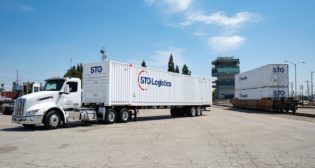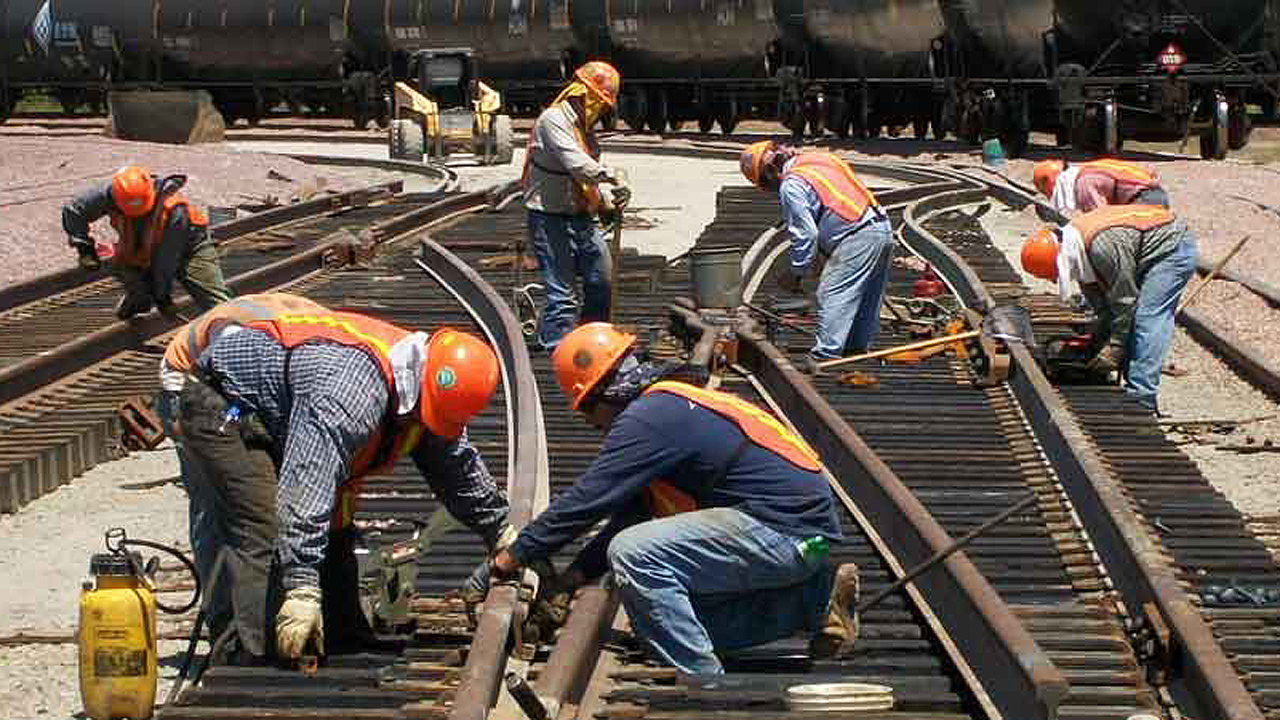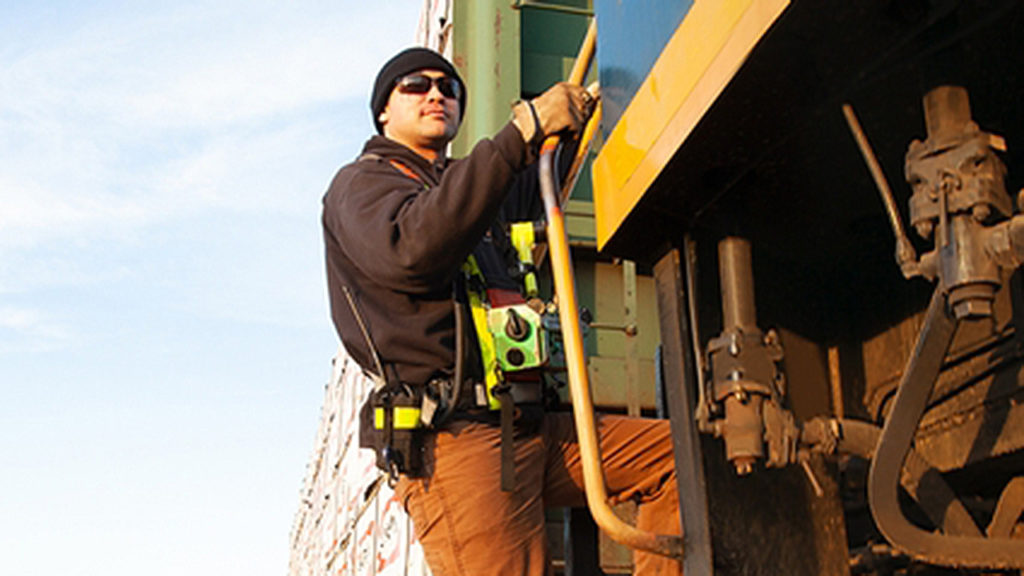
NCCC Proposes ‘Advance Payments,’ Unions Say It’s Not Enough (UPDATED, 3 p.m. ET)
Written by Marybeth Luczak, Executive Editor
The National Carriers’ Conference Committee (NCCC) on April 22 proposed “to enter interim agreements with all rail labor organizations in national handling providing for advance payments of up to $600 per month, representing amounts that are expected to be due under future national collective bargaining agreements.” While most unions had declined as of April 25, NCCC said it would “hold open the proposal” for their further consideration.
The Brotherhood of Maintenance of Way Employes Division-International Brotherhood of Teamsters (BMWE-IBT) on April 22 called the offer “inadequate.” The 10 rail unions of the Coordinated Bargaining Coalition (CBC)—of which BMWE-IBT is not a part—early on April 25 rejected the proposal and sought a proffer of arbitration.
The April 22 NCCC* offer follows CSX’s April 19 announcement that it had reached a “tentative agreement” with the Sheet Metal, Air, Rail and Transportation Workers, Transportation Division (SMART-TD) to provide SMART-TD Trainmen and Yardmasters with “monthly advance payments on future wage adjustments anticipated in settlement of the 2020 round of national bargaining between rail labor and the Class I railroads.” CSX also said it “notified its other labor organization representatives that it intends to reach agreements to provide identical payments to all unionized employees.” (The 2020 round of bargaining began in November 2019.)
The current round of national bargaining has been under way since Jan. 1, 2020, and the NCCC and rail labor coalitions are currently in mediation before the National Mediation Board (NMB). (On April 11, the NMB refused a request from the International Association of Sheet Metal, Air, Rail and Transportation Workers Mechanical Division (SMART-MD) and Brotherhood of Maintenance of Way Employes Division/IBT (BMWED) to be relieved from mediation with the NCCC).

“Rail employees work hard and deserve compensation increases that keep them among the best paid employees in the nation,” NCCC said in its April 22 statement. “The railroads want to reach new national agreements with the labor organizations that provide those increases, but the issues on the national bargaining table are complex and there is more work to be done before complete agreements on all open issues can be finalized.
“Because the bargaining round has been delayed significantly by the COVID-19 pandemic, the railroads have been discussing ways to help alleviate the impact on their employees. The industry has now moved to address the situation with the offer of advance payments. NCCC member carrier CSX, which is not fully participating in national handling with all crafts in this bargaining round, has also moved to address the impact of these delays on a local basis.
“The proposal provides that the monthly payments of up to $600 would be made from May 2022 through the end of the year, or until a negotiated wage settlement is reached, whichever is earlier. The advance payments would be deducted from any retroactive, lump sum, or future pay increases that may be agreed upon in national bargaining.
“The NCCC believes advance payments could address the impact of this unprecedented pandemic on employees while the parties resolve the important issues that remain open in negotiations. In this regard, the railroads look forward to continuing their discussions with all unions in national bargaining and hope to reach fair and reasonable agreements in the near term.”
*The National Carriers’ Conference Committee (NCCC), organized within the National Railway Labor Conference (NRLC), consists of NRLC Chairman, who is also the NCCC Chairman, and senior labor relations executives of five U.S. Class I railroads (BNSF, CSX, Kansas City Southern, Norfolk Southern and Union Pacific), as well as the senior labor relations leader of the U.S. railroads owned directly or indirectly by CN.
BMWED-IBT Speaks Out
The BMWED-IBT late on April 22 addressed the CSX and NCCC offers: “On Tuesday, April 19, 2022, CSX railroad proposed a monthly advance payment agreement to the BMWED General Chairmen and other rail unions. The monthly advance payment agreement provides eligible employees up to a maximum of $4,800 total in advance payments from May 1, 2022 through December 31, 2022 or upon the settlement of this round of national negotiations, whichever comes sooner. The monthly advance payments that you [members] receive would later be deducted from your backpay, if any, that results from a National Agreement. On Thursday, April 21, 2022, the National Carriers Conference Committee (NCCC) made a virtually identical proposal to the BMWED/SMART-MD Coalition and other rail unions. It is attached here for your review [download below].
“Our initial analysis of the NCCC’s proposal is that the maximum payment of $4,800 is equivalent to a general wage increase of less than 1% per year for the first three years of the term of the agreement. This token offer is inadequate. While we see this as another delay tactic by the railroads, we are continuing to evaluate the NCCC’s proposal and are discussing the proposal with the other rail unions.
“Further information and updates regarding the NCCC’s proposal will be forthcoming.”
CBC Unions ‘Reject Lump-Sum Offers, Seek Proffer of Arbitration’
Early on April 25, the CBC** issued the following statement: “On January 24, 2022, after more than two years of bargaining with the major U.S. Class I railroads, the 10 rail unions bargaining as part of the Coordinated Bargaining Coalition (CBC) announced that they had applied to the National Mediation Board (NMB) for the assignment of a federal mediator to assist in the negotiations.
“As we advised then, the carriers represented by the National Carriers’ Conference Committee (NCCC) simply were not bargaining in good faith. Unfortunately, nothing has changed during the four mediated bargaining sessions that the CBC has held with the NCCC. Having reported record 4th quarter 2021 profits, followed by 1st quarter 2022 record profits, the rail carriers continue to refuse to withdraw their demands for work rule and health and welfare concessions. Even more ridiculous and unacceptable is their refusal to agree to meaningful wage increases while making record profits during the highest level of inflation seen in years.
“Adding insult to injury, the NCCC not only refused our request to bargain on wages at our mediated session last week, they then sent the CBC unions a national proposal offering to pay lump sum payments of $600.00 (maximum payment) in the remaining months of 2022 while the parties remain stuck in endless and unproductive mediation. Regardless of the gaslighting the NCCC has done on their proposal, it is not all they say it is. The payments will have to be repaid from any backpay payments that may be in the ultimate national contract settlement. If there are insufficient backpay earnings to repay the lump sums, the employee will owe the employer the balance. All CBC unions, responding in a united front, have rejected the latest NCCC proposal.
“This latest proposal, somewhere between a loan and a pay day advance, is just further evidence that the NCCC has no intentions of reaching a voluntary settlement any time soon. You don’t offer temporary proposals if you plan to offer a complete contract settlement. In fact, the CEOs of UP and CSX both said in their earnings reports this past week that there would be no national contract settlement for months.
“The members of our unions, who have carried the rail carriers through a pandemic and to record profits, deserve a full contract settlement now. Due to the NCCC’s refusal to negotiate such a proposal, all CBC unions have filed requests with the NMB asking that our contract dispute be advanced to the next steps of the Railway Labor Act process, which is for the NMB to proffer arbitration to the parties. Should either party reject the proffer, it would start a 30-day cooling off period before any party could exercise self-help.
“As we advised in January, we had hoped that the involvement of the NMB would cause the industry to refocus on addressing the legitimate needs of the men and women whose labor generates their positive financial returns. That has not happened, and there is no indication that it will without allowing the remaining steps of the Railway Labor Act to play out to compel a favorable settlement.”
** The unions comprising the CBC are: the American Train Dispatchers Association (ATDA); the Brotherhood of Locomotive Engineers and Trainmen / Teamsters Rail Conference (BLET); the Brotherhood of Railroad Signalmen (BRS); the International Association of Machinists (IAM); the International Brotherhood of Boilermakers (IBB); the National Conference of Firemen & Oilers/SEIU (NCFO); the International Brotherhood of Electrical Workers (IBEW); the Transport Workers Union of America (TWU); the Transportation Communications Union / IAM (TCU), including TCU’s Brotherhood Railway Carmen Division (BRC); and the Transportation Division of the International Association of Sheet Metal, Air, Rail, and Transportation Workers (SMART–TD). Collectively, the CBC unions represent more than 105,000 railroad workers covered by the various organizations’ national agreements, and comprise over 80% of the workforce who will be impacted by this round of negotiations.
NCCC ‘Holds’ Offer
Late on April 25, NCCC reported that the proposal to provide advance payments of up to $600 per month would remain on the table, even though most rail labor organizations in national handling rejected it. “Rail employees work hard and deserve compensation increases that keep them among the best paid employees in the nation,” NCCC said. “The railroads want to reach new national agreements with the labor organizations that provide those increases, but the issues on the national bargaining table are complex and there is more work to be done before complete agreements can be finalized. The railroads’ advance payment proposal is intended to help mitigate the impact of COVID-related delays in the bargaining process on the employee group while the parties continue to discuss the many important issues that remain open in negotiations.
“Even if the parties reach tentative agreements promptly, those agreements generally must be ratified by the union membership before they become effective and payments can be made. It can take a number of months for the ratification process to be completed and for payments due under the agreements to be calculated and processed. As a result, the railroads believe that regardless of when tentative agreements are reached, the monthly advance payment proposal is the best way to put money in employees’ hands now.”
Wilner Weighs In
Railway Age asked Capitol Hill Contributing Editor Frank N. Wilner for his take. Wilner—author of “Understanding the Railway Labor Act” and a former director of public relations for the United Transportation Union and its SMART-TD successor—had this to say:

“Two sides are required to reach voluntary settlements. Alleging blame on the carriers for not reaching one suggests demands of only one side matter. The unions, by seeking immediate release from the bargaining table, seek to set in motion Railway Labor Act provisions leading to a nationwide railroad work stoppage this summer, exacerbating supply chain shortages and undermining national defense transportation needs in the midst of Russian military aggression and growing Chinese Pacific Rim hegemony.
“Well known to rail labor, the National Mediation Board does not declare bargaining impasses—commencing a 90-day clock toward a nationwide work stoppage—during election years. Labor allies have no desire to choose sides prior to elections, with history recording—often to labor’s dismay—that even in non-election years lawmakers vote the interests of the American economy. If labor’s frustration is the length of these negotiations, the fault lies with a pandemic that limited bargaining sessions—and, to some extent, labor negotiators who chose not to use electronic alternatives to face-to-face meetings. Notably, it was not until a few months ago that 10 of the 12 labor organizations sought formal mediation.
“The carriers are offering a good-faith and voluntary interest-free loan while the sides remain at the bargaining table. As the adage goes, ‘when you get a good deal, take it’—especially if it puts more dollars into members’ pockets.
“Also of note, during the Korean War when rail labor struck, Democratic President Harry Truman said if they didn’t want to work he would draft them into the Army.”



